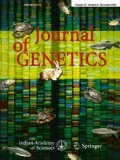Abstract
The broad spectrum of causal variants in the newly discovered GIPC3 gene is well reflected in worldwide studies. Except for one missense variant, none of the reported variants had reoccurred, thus reflecting the intragenic heterogeneity. We screened all the six coding exons of GIPC3 gene in a large cohort of 177 unrelated prelingual hearing impaired after excluding the common GJB2, GJB6 nuclear and A1555G mitochondrial variants. We observed a single homozygous pathogenic frameshift variant c.685dupG (p.A229GfsX10), accounting for a low incidence (0.56%) of GIPC3 variants in south Indian population. GIPC3 being a rare gene as a causative for deafness, the allelic spectra perhaps became much more diverse from population to population, thus resulting in a minimal recurrence of the variants in our study, that were reported by authors from other parts of the globe.


References
Ahmed Z. M., Morell R. J., Riazuddin S., Gropman A., Shaukat S., Ahmad M. M. et al. 2003 Mutations of MYO6 are associated with recessive deafness, DFNB37. Am. J. Hum. Genet. 72, 1315–1322.
Ain Q., Nazli S., Riazuddin S., Jaleel A. U., Riazuddin S. A., Zafar A. U. et al. 2007 The autosomal recessive nonsyndromic deafness locus DFNB72 is located on chromosome 19p13.3. Hum. Genet. 122, 445–450.
Ammar-Khodja F., Bonnet C., Dahmani M., Ouhab S., Lefèvre G. M., Ibrahim H. et al. 2015 Diversity of the causal genes in hearing impaired Algerian individuals identified by whole exome sequencing. Mol. Genet. Genomic Med. 3, 189–196.
Amritkumar P., Jeffrey J. M., Chandru J., Kalaimathi M., Ramakrishnan R., Karthikeyen N. P. et al. 2018 Role of DFNB1 mutations in hereditary hearing loss among assortative mating hearing impaired families from South India. BMC Med. Genet. 19, 105.
Asgharzade S., Tabatabaiefar M. A., Mohammadi-Asl J. and Chaleshtori M. H. 2018 A novel missense mutation in GIPC3 causes sensorineural hearing loss in an Iranian family revealed by targeted next-generation sequencing. Int. J. Pediatr. Otorhinolaryngol. 108, 8–11.
Azaiez H., Booth K. T., Ephraim S. S., Crone B., Black-Ziegelbein E. A., Marini R. J. et al. 2018 Genomic landscape and mutational signatures of deafness-associated genes. Am. J. Hum. Genet. 103, 484–497.
Charizopoulou N., Lelli A., Schraders M., Ray K., Hildebrand M. S., Ramesh A. et al. 2011 Gipc3 mutations associated with audiogenic seizures and sensorineural hearing loss in mouse and human. Nat. Commun. 2, 201.
Chen A., Wayne S., Bell A., Ramesh A., Srisailapathy C. S., Scott D. A. et al. 1997 New gene for autosomal recessive non-syndromic hearing loss maps to either chromosome 3q or 19p. Am. J. Hum. Genet. 71, 467–471.
Dror A. A. and Avraham K. B. 2010 Hearing impairment: a panoply of genes and functions. Neuron 68, 293–308.
Finsterer J. and Fellinger J. 2005 Nuclear and mitochondrial genes mutated in nonsyndromic impaired hearing. Int. J. Pediatr. Otorhinolaryngol. 69, 621–647.
Hilgert N., Smith R. J. and Van Camp G. 2009 Forty-six genes causing nonsyndromic hearing impairment: which ones should be analyzed in DNA diagnostics? Mutat. Res. 681, 189–196.
Katoh M. 2002 GIPC gene family. Int. J. Mol. Med. 9, 585–589.
Katoh M. 2013 Functional proteomics, human genetics and cancer biology of GIPC family members. Exp. Mol. Med. 45, e26.
Khan A., Han S., Wang R., Ansar M., Ahmad W. and Zhang X. 2019 Sequence variants in genes causing nonsyndromic hearing loss in a Pakistani cohort. Mol. Genet. Genomic Med. 7, e917.
Ramzan K., Al-Owain M., Allam R., Berhan A., Abuharb G., Taibah K. et al. 2013 Homozygosity mapping identifies a novel GIPC3 mutation causing congenital nonsyndromic hearing loss in a Saudi family. Gene 521, 195–199.
Rehman A. U., Gul K., Morell R. J., Lee K., Ahmed Z. M., Riazuddin S. et al. 2011 Mutations of GIPC3 cause nonsyndromic hearing loss DFNB72 but not DFNB81 that also maps to chromosome 19p. Hum. Genet. 130, 759–765.
Selvakumari M. 2015 Screening for deafness causing mutations in GJB2, GJB6 and MT-RNR1 genes among childhood hearing impaired from Chennai. Ph.D. dissertation. University of Madras.
Siddiqi S., Ismail M., Oostrik J., Munawar S., Mansoor A., Kremer H. et al. 2014 A canonical splice site mutation in GIPC3 causes sensorineural hearing loss in a large Pakistani family. J. Hum. Genet. 59, 683.
Sirmaci A., Edwards Y. J., Akay H. and Tekin M. 2012 Challenges in whole exome sequencing: an example from hereditary deafness. PLoS One 7, e32000.
Sloan-Heggen C. M., Bierer A. O., Shearer A. E., Kolbe D. L., Nishimura C. J., Frees K. L. et al. 2016 Comprehensive genetic testing in the clinical evaluation of 1119 patients with hearing loss. Hum. Genet. 135, 441–450.
Yan D., Tekin D., Bademci G., Foster J., Cengiz F. B., Kannan-Sundhari A. et al. 2016 Spectrum of DNA variants for non-syndromic deafness in a large cohort from multiple continents. Hum. Genet. 135, 953–961.
Acknowledgements
We thank all the participants in our study for their co-operation. This study was supported by ICMR, UGC-UPE Phase II, UGC-SAP, DST-FIST II, DBT multicentric project (BT/PR26850/MED/12/80/2017) and UGC Research Scientist Scheme (F.8-17(SC)/90(SA-II)) grants sanctioned to CRS. We are grateful to Dr N. P. Karthikeyan (ENT Surgeon, DOAST Hearing Care Center, Anna Nagar, Chennai) for conducting clinical investigations. Fellowship supports: MK, ICMR FA, URF; MS, DBT RA; JMJ, CSIR & DBT SRF; MSK and PVS, ICMR SRF; JC and NS, UGC BSR SRF.
Author information
Authors and Affiliations
Corresponding author
Additional information
Corresponding editor: B. K. Thelma
Electronic supplementary material
Below is the link to the electronic supplementary material.
Rights and permissions
About this article
Cite this article
KALAIMATHI, M., SUBATHRA, M., JEFFREY, J.M. et al. Low incidence of GIPC3 variants among the prelingual hearing impaired from southern India. J Genet 99, 74 (2020). https://doi.org/10.1007/s12041-020-01234-6
Received:
Revised:
Accepted:
Published:
DOI: https://doi.org/10.1007/s12041-020-01234-6

